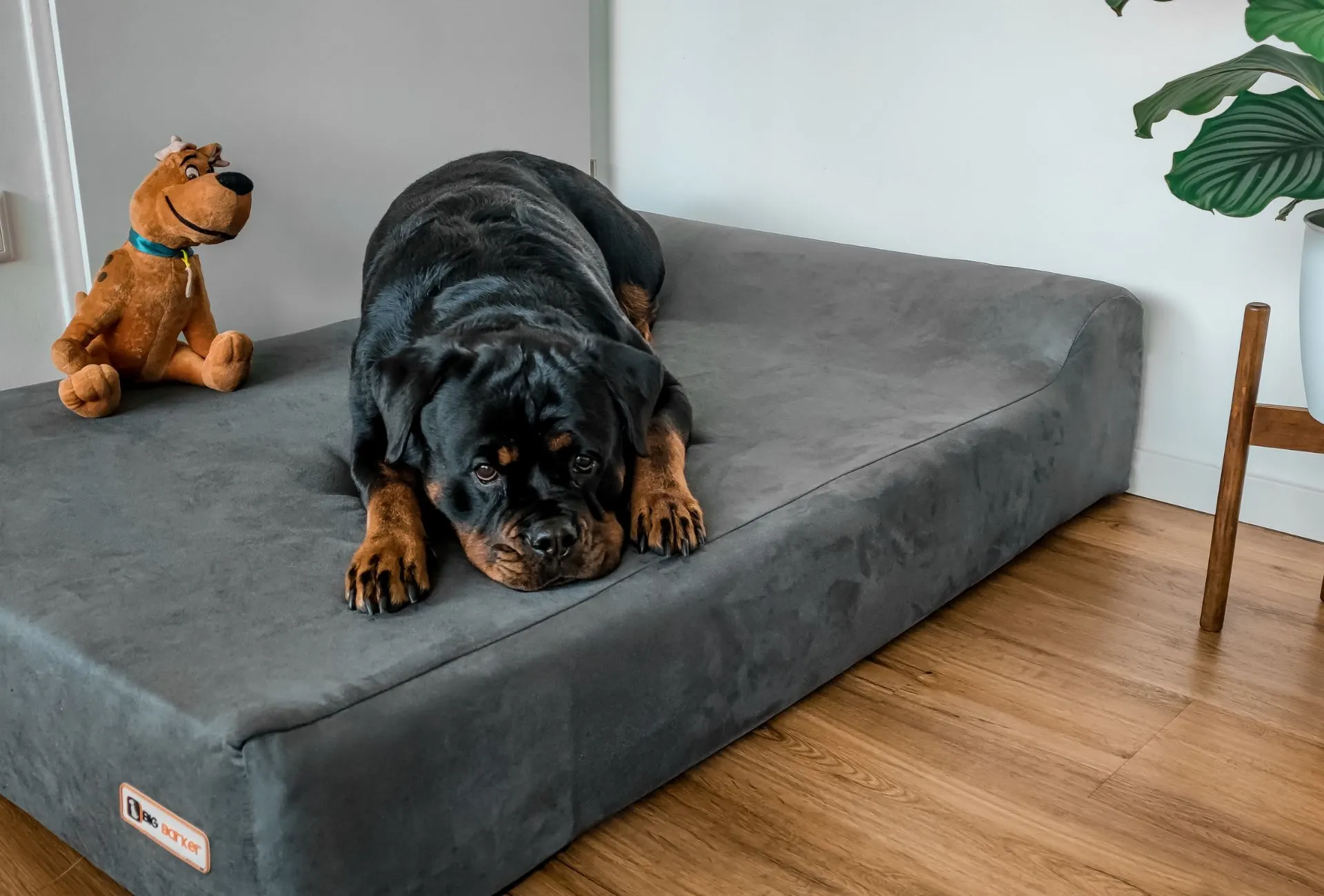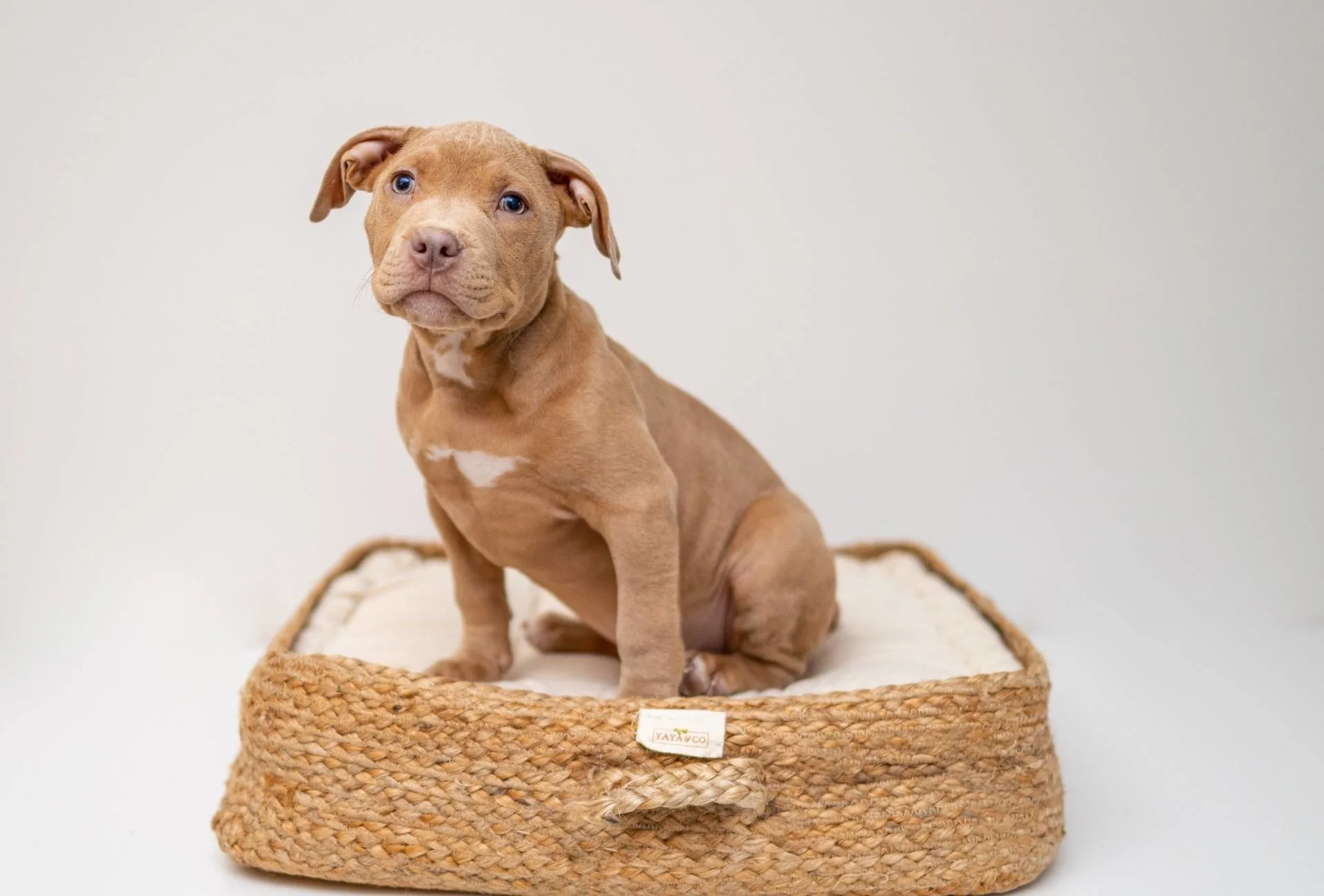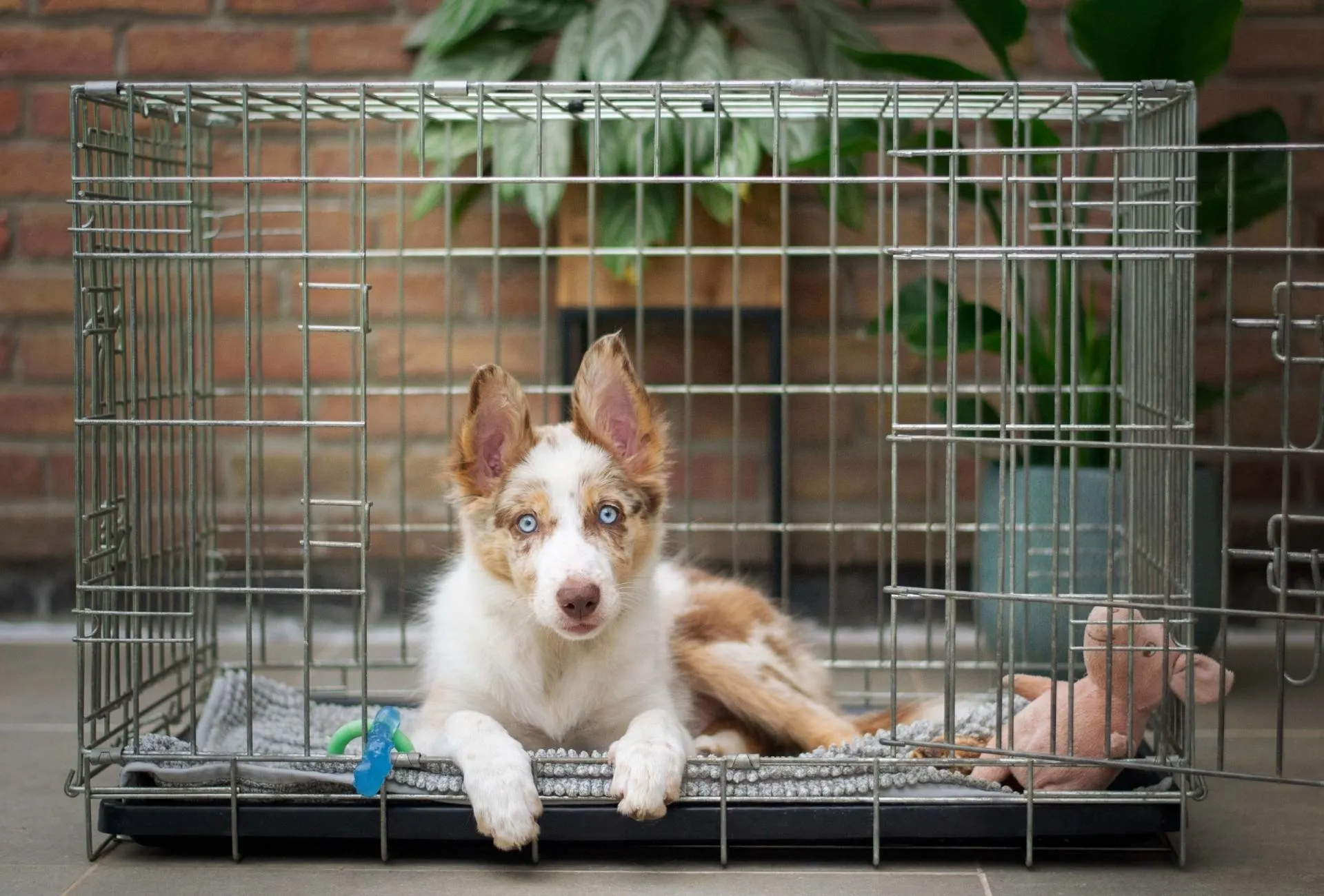Ah, the good old question of where to let your puppy sleep.
In your bedroom? Another room? Downstairs? In a crate? On the bed?
I’ve been there.
When I brought my 8-week-old Rottweiler puppy home, we had a plan and even though stuff like schedules will change, you should stick to the sleeping choices.
Why?
Changing the sleeping routine is really stressful for your pup which influences their sleep quality as well as acceptance of that sleeping spot.
Every individual is different and needs their own adjustment period.
Consistency is key which means not switching around with sleeping spots and no exceptions.
Personally, my dog has slept in a crate next to me from day one, but I quickly ditched the crate.

Never changed her sleeping spot since and never regretted that choice.
Why did I keep her close to me?
There are some serious benefits to keeping your dog in your room.
However, there are also a couple of special cases where it’d make more sense to place the dog somewhere else.
I’ll make sure to highlight all the benefits, especially in regards to bonding with your pup, training progress, and safety.
How Long Should A Puppy Sleep In Your Room
A puppy should sleep in your bedroom until they’re potty trained which usually happens around 4 months. Letting your pup sleep in your room forever has advantages.
If your puppy is not yet house-trained, it’s not a good idea to let them sleep outside your room.
You might miss the times when your pup is crying for a potty break and generally, it’s not as safe.
The fewer accidents happen, the better your pup will feel (and you too, since house training will be faster).
Besides, who wants to clean up their mess at night?
You’ll probably be sleep deprived for the first few nights anyway.

Safety considerations can be split into internal and external events.
Emergencies, where your pup needs immediate veterinary attention, are easier to spot if they’re with you at night.
Also, a pup outside your room can get into a lot more trouble.
If the pup is in a crate, they should be safe from themselves but even then, puppies manage to do the strangest stuff with their blanket or puppy pads.
External safety means something such as a break-in.
Not only will your dog be spared from being first in the line of fire, but they’re also a security system for you.
Barking is noticed more quickly which would provide you with more time to react.
Also, never moving your dog out of the bedroom can also increase their bond and build confidence.
So in short all the reasons why you may want to keep your pup inside your bedroom at night beyond the age of 4-6 months.
- Fewer potty accidents and quicker training
- Emergencies are easier to spot
- Save from late-night shenanigans
- Increased security for your pup (and you)
- Stronger bond

However, there are some reasons against letting your pup sleep in your bedroom forever.
First off, if you or your partner suffer from severe allergies, it might not be a suitable solution forever.
Also, after you’ve satisfied all their needs, a pup might still cry the first few nights.
So having the puppy in another room makes it easier to sleep (unless your pup’s crate is soundproof).
Being together with your dog 24/7 sounds great but can feed into separation anxiety.
However, all these issues can definitely be managed so it’s up to you to weigh the pros against the cons.
My pup will always sleep in the same room as I do and that’s what I’d recommend for most dog owners.
When To Move Puppy Crate Out Of Bedroom
Your puppy crate can safely be moved out of the bedroom as soon as the pup is potty trained and can confidently sleep alone.
If your pup stays with you in the bedroom, you can upgrade to a larger crate or transition them out of the crate.
Sometimes, it’s best to discard the entire crate.
I’ve done so with my Rottweiler and it was the best decision for us.
However, if you’re changing the rooms your puppy will sleep in, it’s best to keep the crate for the first few weeks to make sure you don’t change too much at once.
Some puppies need longer than others and that’s perfectly fine.
While you can transition some pups at 3-4 months of age, you should wait until 6 months or more with others if you experience issues.
Technically, your dog doesn’t need to sleep in a crate in your room from day one but as mentioned above, it has its benefits.
Leaving Puppy Downstairs At Night
You can leave your puppy downstairs at night with a couple of precautions but it’s not advised, especially not if they’re not yet potty trained.
The only positive thing that I can think of is that your pup won’t have to scramble upstairs.
If your puppy sleeps downstairs instead of in your bedroom, you’ll respond a lot slower to potty requests.
Not only is the pup uncomfortable after soiling their sleeping space, but it’ll also set back potty training.
In the first few nights, the puppy downstairs might feel left alone and cry even more than they would’ve done otherwise.
Can I Leave My Puppy In Another Room At Night?
You can leave your puppy in another room at night but it’ll diminish a bonding opportunity and comes with a couple of downsides.
Similar to leaving your dog downstairs, you won’t be able to respond quickly to potty cries at night.
You might think that can be solved by setting a timer and just getting up in regular intervals but there can still be accidents in between.
But if you’re an allergy sufferer as mentioned above or you have other serious concerns, it might be okay to leave them in another room.
If you leave your puppy in another room, make sure the temperature is good, the environment is safe, and that your pup was well fed, exercised, and went potty before sleeping.
Where Should My Puppy Sleep At Night Time
It’s best to let your puppy sleep in a crate next to your bed at night and prepare for quick potty breaks.
Personally, I’ve transitioned pretty quickly to a dog bed with my Rottweiler and it was perfect.
But the spot has never changed, it’s right beside the bed.
Once bedtime arrives, she’ll even run into the bedroom to settle in her bed.
However, your and your puppy’s needs might be entirely different so it’s up to you where to place them and whether or not you use a crate.
Can My Puppy Sleep With Me The First Night?
Yes, your puppy can sleep with you but you should be aware that it becomes a habit extremely quickly.
If you want to let your puppy sleep with you the first night, be prepared to keep it that way.
Co-sleeping can be great for puppies but they don’t understand exceptions.
Letting them sleep with you the first night and then moving them to their crate (or even another room) is setting yourself up for failure.
Choose a method and stick to it. No exceptions.
Whether you let your pup sleep in your room, another room, or even downstairs is dependent on many factors.
There are considerable upsides to letting your dog sleep with you but if it’s just not feasible, it’s great to at least transition at an appropriate time.
If potty training or something else is seriously impacted, take a step back and transition slowly.
Disclaimer: This blog post does not substitute veterinary attention and does not intend to do so. I am not a veterinarian or pet nutritionist. If your dog shows any sign of illness, call your vet.